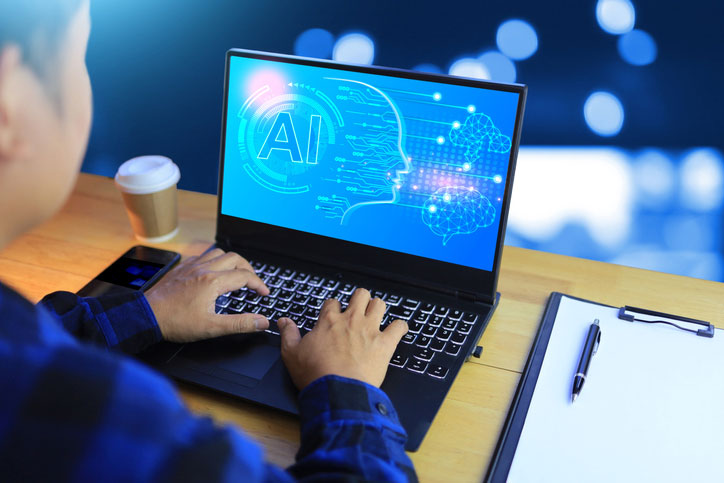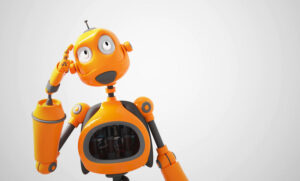Written by Scott Wilson

The very concept of engineering as a profession emerged with the invention of steam power… and the world changed. When Marconi created wireless telegraphy, the role of radio engineers emerged… and the world changed. The Wright brothers took flight at Kitty Hawk and the field of aeronautical engineering emerged… you get the picture.
Today, it’s the creation of artificial intelligence that’s having a similarly massive impact on the world. And just as has happened before and will happen again, a job has come with the new invention that will help create that impact: the artificial intelligence engineer.
Some people are already calling artificial intelligence the harbinger of the Fourth Industrial Revolution.
Each of those other engineering roles emerged partly-formed from raw ideas and had to be hammered into a reality of knowledge, skill, and professional expertise by those who took up the call. The same is true of artificial intelligence engineering. These are the days, and this is the generation of AI engineers who will define the role.





The only question is, will you be among them?
What Is an AI Engineer?
 All the developments in AI have been at the hands of researchers and scientists conducting the experiments and demonstrations of AI’s potential. And as AI breaks into the world of practical applications and well-regulated use, it’s the professional engineers who are solving problems, developing new systems, and managing the changes that come with the incredible new capabilities.
All the developments in AI have been at the hands of researchers and scientists conducting the experiments and demonstrations of AI’s potential. And as AI breaks into the world of practical applications and well-regulated use, it’s the professional engineers who are solving problems, developing new systems, and managing the changes that come with the incredible new capabilities.
The definition of what an AI engineer is will continue to emerge and evolve along with other AI careers as the field comes into its own over the next handful of years.
As a defined job title, it didn’t even exist a decade ago. In Google Trends, it basically breaks out into the wild as a search term in 2016 or so, just as new breakthroughs in deep learning and robotics started to trickle out of academia and into the public eye, AI starts to beat human players regularly at tough games like Go, and early versions of generative pre-trained transformers (GPT) were being tested.

With the launch of ChatGPT in mid 2022 came a predictable spike and return to baseline in that trend. And in the years since, search interest has remained steady with no sign of faltering.
A group of scientific luminaries including Stephen Hawking and Peter Norvig signed an open letter of concern about the impact of AI research on society in 2015… a sure sign a new industry was emerging.
What Does an AI Engineer Do?
AI engineers are the professionals who will take breakthrough developments in thinking machinery and apply it to real-world tasks and challenges.
If AI is the new universal gear to turn the power wheels of every industry, AI engineers are the lubricant to make those gears mesh. They are experts in some of the most complex computational systems ever developed. But they also have a practical understanding of business problems, social expectations, and domain expertise in a range of industries.
What AI engineers do is build. They apply the power of thinking machines to a range of tasks and problems that require reasoning to overcome.
AI Engineer Job Descriptions Can Be Broad in a Field Still Finding Itself
 The problems and capabilities in the AI world are still evolving. That makes the day-to-day life of an AI engineer very flexible.
The problems and capabilities in the AI world are still evolving. That makes the day-to-day life of an AI engineer very flexible.
Now, the specific details of those tasks and the working environment will change quite a bit from industry to industry.
If you’re working in industrial robotics as an AI engineer, you can expect a very different day from an engineer developing financial analysis and trading systems.
But some core tasks in AI engineering will seem familiar in any context. Those include:
- Writing software code to implement algorithms and interfaces for AI systems
- Compiling and defining datasets to serve as training sources for AI models
- Overseeing supervised training of machine learning models and development of artificial neural networks for specific tasks
- Test and troubleshoot issues arising from the use of AI systems
- Developing interfaces between other business technology and AI
If you zoom out a bit, though, AI engineering resembles the typical template of high-tech development and engineering jobs. That means each day revolves around the general exercise of:
- Communicating with stakeholders and defining requirements and objectives
- Developing plans and designs to meet the objectives, breaking down the problems into pieces and translating them into AI terms and abilities
- Coordinating with fellow engineers and other specialists on the work of building out the new systems
- Creatively solving problems and researching new ideas and developments
In short, AI engineering is quite a bit like other types of software engineering. The major difference required is the depth and complexity of the knowledge required, and the broader area of applications available to thinking machines.
AI Engineering Is a Different Process in Different Industries
So a good place to start thinking about AI engineering careers is to think about the types of industries you may want to work within in that role. Some of the early adopters in AI engineering include:
- Healthcare - Engineers fill find work both adapting AI to common administrative systems on the business side, as well as helping with specialized imaging and diagnostics using the power of machine learning.
- Accounting and Finance - AI is being used in highly specialized financial trading systems and in more typical accounting tasks like sorting and categorizing transactions and receipts.
- Science - New discoveries are already coming in fields like materials science and biology as AI engineers build predictive models.
- Manufacturing - AI in robotics will be the big focus in engineering for manufacturers, but the industry will also see AI systems being developed for workflow automation and process optimization.
- Transportation - Speaking of flows, traffic flow is an early focus for AI engineers in transportation. That’s on top of the big investments being made in self-driving vehicles.
- Arts & Entertainment - AI is already changing the face of the film and recording industry, as AI engineers use increasingly powerful systems to generate effects and simplify the production process.
Of course, there are a bewildering number of sub-industries within each of those general areas… healthcare AI engineers might specialize in radiology image interpretation, surgical robots, or bioinformatics analysis. Transportation AI engineers could be creating the next self-driving vehicle or developing systems to interpret traffic camera images and manage traffic flows.
How Much Do AI Engineers Make? – Pinning Down AI Engineer Salary Levels
 The question of how much AI engineers earn isn’t one that comes with a straightforward answer.
The question of how much AI engineers earn isn’t one that comes with a straightforward answer.
First, of course, you have the usual differences in salary rates between different levels of education. While most AI engineers will have more advanced degrees, some jobs can be found at the bachelor’s level, which are generally less lucrative.
There are also geographic differences in standard salary ranges, although with remote work becoming more common in AI as elsewhere, these are harder to account for.
Next, every industry has its own challenges and expectations, which will influence pay rates. Our AI Salary page has some more details on these influences.
AI engineering salary levels may be found in any of three different Bureau of Labor Statistics (BLS) categories. It’s likely that the actual BLS accounting in each of these categories includes some AI engineers. But because the Bureau has not yet established any unique classification for AI industry or positions, it’s not possible to separate them out.
Still, we can assume that anyone working in AI is likely to beat the averages. Based on higher skill and education levels, you are likely looking at the top ten percent. For these categories, the 2022 data put those numbers at:
- Computer Programmers - $157,690
- Software Developers, Quality Assurance Analysts, and Testers - $159,740
- Computer Hardware Engineers - over $208,200
The AI Engineer Career Path May Be Merging with Traditional Software Engineering
 As AI and machine learning have become more capable and more common, they have already trickled out into many professional applications. Recommendations systems at companies like Netflix and Amazon are driven by AI today. AI helps drive cars and forecast the weather.
As AI and machine learning have become more capable and more common, they have already trickled out into many professional applications. Recommendations systems at companies like Netflix and Amazon are driven by AI today. AI helps drive cars and forecast the weather.
In some cases, this is due to new ML-driven capabilities that have made their way into these different fields. In other cases, it’s a sort of re-definition of jobs and technologies that were already in widespread use in artificial intelligence.
As AI tools and techniques drift into more and more fields and industries, the lines around AI engineering as a profession will be harder and harder to draw.
This has led to a situation where there are plenty of existing roles with various tasks that fit comfortably into the list of tasks that an AI engineer will perform. But the job titles aren’t necessarily changing along with them.
You’ll find AI engineering positions with such varied titles as:
- Artificial Intelligence Specialist
- Business Intelligence Developer
- AI Inference Engineer
- Roboticist
- System Design Engineer
- Machine Learning Engineer
- AI Developer
It’s better to look at the role of AI engineering as defined by the kinds of tasks they perform rather than the titles.
Sorting Out Job Titles in AI Engineering May Take a While
 This sort of title drift is because the very concept that software development intersects with engineering is a squishy one. In fact, there’s a lot of debate in computer science professional communities about the use of the term engineering.
This sort of title drift is because the very concept that software development intersects with engineering is a squishy one. In fact, there’s a lot of debate in computer science professional communities about the use of the term engineering.
That’s because engineers, in other fields and through recent history, have been members of a regulated and licensed professional class. Society decided early on that people putting together nuclear reactors or building bridges should demonstrate their qualifications. They needed to be regulated and accountable for errors.
As anyone who has used any piece of business or consumer software can tell you, software engineering offers no such guarantees.
The term was invented by Margaret Hamilton, one of the designers and programmers behind the systems software that ran the Apollo moon landers. At NASA, with billions of dollars, national prestige, and lives on the line, software design and programming were handled much more systematically… as an engineering problem.
The term, however, trickled out into the wider software world. Today, it’s applied to many technical roles in computer systems, ML, and AI. But because it’s not regulated as it is in the world of physical engineering, you won’t necessarily see it used consistently in job titles.
How to Become an AI Engineer
 The path to becoming an AI engineer is not yet set in stone.
The path to becoming an AI engineer is not yet set in stone.
It always starts with education, however. And the more the better.
Many people are drifting into the role from existing jobs in software engineering and development. They come in with the kind of education in math, computer science, and data science that is easy to convert to ML and AI concepts and techniques. The bachelor’s or master’s degrees they already hold in those areas can be adapted to AI engineering work with short and focused certificate programs.
For anyone who is just beginning to prepare for a career in AI engineering today, a master’s degree is the standard goal. Getting there will require a four-year foundation at the bachelor’s level that is packed with programming, algorithm development, and advanced mathematics.
Alongside education runs experience. It’s tough to get experience in AI directly before you get a position in the field, but you can build your core skills through related positions in software engineering or data science. Those include skills like:
- Software architecture
- Programming
- Statistical analysis
- Algorithm design and use
As with any job in any profession, it’s also useful to start networking. This can happen as early as your university years. In fact, at the master’s level the various conferences and research projects you engage with are prime opportunities to connect with other people in the field.
You can find a more step-by-step guide on how to become an AI engineer here.
What Skills are Required to Become an AI Engineer?
 AI engineer skill requirements are steep.
AI engineer skill requirements are steep.
Basic coding and mathematical expertise are just table stakes. AI engineers must have a strong understanding of statistical analysis and techniques that underlies everything else in their portfolio. And they need programming skills in at least one language, and often several, to implement those routines and structures.
The most common machine learning models today deal with statistical elements based on Bayesian, Gaussian, and Markov models. Programming languages like Python, Java, C++, and R are commonly used to program AI.
AI engineers also need to have a good grasp of all the common current implementations of routine AI technologies like:
- Natural Language Processing
- Computer Vision
- Deep Learning and Artificial Neural Networks
- Automation and Robotics
The emphasis will naturally shift based on the industry and applications you are working on. But deep familiarity of calculus, algebra, and computer science principles will be a common thread no matter where you land.
Graduate Degrees Are Common AI Engineer Education Requirements
 Today, AI remains new enough and complex enough that most AI engineer jobs are going to people who have earned relevant master’s degrees in AI.
Today, AI remains new enough and complex enough that most AI engineer jobs are going to people who have earned relevant master’s degrees in AI.
Up until a few years ago, there were very few degree majors available in AI itself. As a result, many people working in the field today have got there with degrees such as:
- Master of Science in Mathematics
- Master of Science in Computer Science with a concentration in Artificial Intelligence
- Master of Science in Machine Learning
- Master of Science in Data Science
- Master of Science in Statistics
And there are several specific domains in AI engineering where people often come through a side door, such as natural language processing. A Master of Computational Linguistics or a Master of Science in Computer Vision can unlock specific positions in areas of AI engineering that rely on those technologies.
Finally, AI engineers working in specialized and specific professional applications such as mechanical engineering of health informatics, often have a degree in that intersects with AI and the professional field in question. In those cases, their AI credentials are more likely to come through graduate certificate programs, such as a Graduate Certificate in AI Engineering Fundamentals – Mechanical Engineer or a Graduate Certificate in AI Digital Health.
Can You Become an AI Engineer Without a Master’s Degree?
 Although most of the demand is for talented candidates with advanced degrees in AI, as the field becomes more consistent and the basic tools are established, more and more AI engineering jobs are likely to require only a bachelor’s degree. Something like a Bachelor of Science in Applied Artificial Intelligence or a Bachelor of Science for Artificial Intelligence in Business can serve not only as essential job qualifications for those roles, but a necessary step on your way to a master’s or doctoral degree should you pursue one.
Although most of the demand is for talented candidates with advanced degrees in AI, as the field becomes more consistent and the basic tools are established, more and more AI engineering jobs are likely to require only a bachelor’s degree. Something like a Bachelor of Science in Applied Artificial Intelligence or a Bachelor of Science for Artificial Intelligence in Business can serve not only as essential job qualifications for those roles, but a necessary step on your way to a master’s or doctoral degree should you pursue one.
There is also a lot of room at the top of the profession where doctoral graduates are the preferred hires. So a PhD in Artificial Intelligence or a Doctor of Engineering in Artificial Intelligence and Machine Learning may be needed to get you into the very top spots.
This is the case for engineers doing applied work in high-skill fields, where a degree like a PhD in Mechanical Engineering AI and Materials Track or a PhD in AI in Medicine may be the best preparation.
Specializations Help Align Your Education with Your Long-Term Career Goals
Universities are already rolling out focus and concentration areas in AI degrees that line up with many of the specializations in the world of AI engineering.
Some specializations focus on AI technologies or skillsets. Those include:
- Natural Language Processing
- Machine Learning
- Data Science
- Vision
- Numerical Computation
- Human-Centered Computing
- Robotics and Automation
- Knowledge Management and Reasoning
Others aim at specific applications or industries. Those can include:
- Software Systems and Cloud Computing
- Cybersecurity
- Bioengineering
- Environmental Engineering
- Molecular and Nanoscale Engineering
- Connected Vehicles
- Business Intelligence
Also, particularly in the graduate degree programs that most employers prefer, students have a lot of flexibility to tailor their studies toward their area of professional interest. No matter what the concentration, if any, in a PhD in AI, you will have the opportunity to bend it toward particular coursework and research areas. Working with your advisor, you can customize a field of study around your intended career path.
The resulting capstone or dissertation project will break new ground in that field. And it will serve as a ready-made calling card when it’s time to start sending applications out.
Exploring Options in Professional AI Engineer Certification
 Like other areas within information technology, professional AI certification may also play a role in getting hired as an AI engineer. Unliked educational certificate programs, professional certifications are focused on assessing and validating your skillsets in well-defined areas. While an educational certificate will give you a defined set of college-level coursework, professional certs will have classes laser-focused on specific tasks or technologies.
Like other areas within information technology, professional AI certification may also play a role in getting hired as an AI engineer. Unliked educational certificate programs, professional certifications are focused on assessing and validating your skillsets in well-defined areas. While an educational certificate will give you a defined set of college-level coursework, professional certs will have classes laser-focused on specific tasks or technologies.
This tells employers that you have mastered those state-of-the-art areas of AI engineering. That’s particularly valuable when the company has a particular platform and needs a new hire to hit the ground running. Something like a Microsoft Certified AI Engineer Associate or an IBM AI Engineering Professional Certificate offers that assurance.
Similarly, an Intel AI Edge Certification or a Nvidia Jetson AI Certification deliver a stamp of approval on those various hardware platforms, commonly used in ML training.
And there are a range of non-AI certifications that can still be powerful in looking for AI engineering positions. Amazon has a series of AWS certifications that tell businesses you are a pro with one of the most heavily used computational platforms available for cloud ML training. A certification like the CISSP (Certified Information Systems Security Professional) may be useful in AI engineering jobs focused on cybersecurity. And any of the various available machine learning professional certifications could help put you in the running for positions with heavy reliance on deep learning or other ML skills.
It won’t be long, though, before AI engineers are inventing their own new specialties and niches. If you’re up for the challenge, you could be one of the people defining an all new AI engineering role for the next generation.
2022 US Bureau of Labor Statistics salary and employment figures for Computer Hardware Engineers, Computer Programmers, and Software Developers, Quality Assurance Analysts, and Testers reflect national data, not school-specific information. Conditions in your area may vary. Data accessed December 2023.




